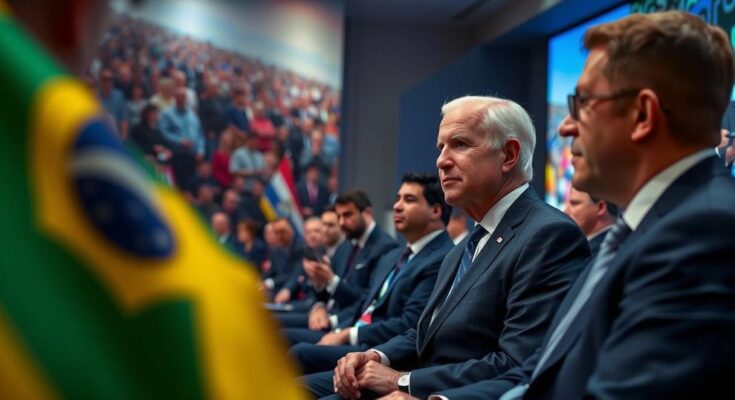President Biden embarks on a six-day visit to Peru and Brazil for pivotal international summits, amid global leaders’ anticipation regarding Trump’s return to power. The discussions will address climate change, infrastructure, and longstanding geopolitical tensions, especially concerning the U.S.-China relationship. Biden aims to reassure allies while navigating an uncertain transition of power, with a focus on international commitments and support for Ukraine.
President Joe Biden initiates a six-day diplomatic journey to Peru and Brazil, marking the conclusion of significant international summits during his presidential tenure. The agenda includes participation in the Asia-Pacific Economic Cooperation (APEC) summit in Peru and the Group of 20 (G20) leaders summit in Brazil, alongside visits to the Amazon rainforest. This international engagement presents Biden one of his concluding opportunities to connect with global leaders amidst increasing anticipation regarding Donald Trump’s forthcoming presidency. Attention from international leaders is predominantly focused on Trump, who is reportedly garnering congratulations and evaluating potential appointments for national security and foreign policy roles. Notably, South Korean President Yoon Suk Yeol is preparing for potential social engagements with the golf-oriented Trump. Erin Murphy from the Center for Strategic and International Studies assesses Biden’s current position, noting, “This is not going to be a swan song for Biden. Not only is he a lame duck, but a super lame duck because his successor is going to have very different policies.” Despite speculation over Biden’s perceived limitations, White House officials assert the value of the upcoming discussions on substantive global issues, encompassing climate change, infrastructure development, narcotics control, and direct encounters with influential figures such as Chinese President Xi Jinping and South Korean Prime Minister Yoon. National Security Adviser Jake Sullivan emphasized that Biden’s longstanding message remains firm—that allies are crucial for national security and amplify the United States’ capabilities. The dialogue between incoming President Trump and Biden covered various international conflicts, with Trump affirming, “I wanted — I asked — for his views, and he gave them to me.” The transition also highlights the incoming administration’s focus on U.S.-China relations, which is deemed of paramount importance. Trump has signaled his intent to appoint prominent figures, including Florida Senator Marco Rubio as Secretary of State and Representative Mike Waltz as National Security Adviser, both recognized for their strong stances on China. Biden’s impending meeting with Xi is anticipated as a pivotal moment, with significant discussions expected regarding trade tensions and economic competition. Additionally, Biden is expected to urge international allies to maintain support for Ukraine amidst ongoing conflict with Russia. This visit to the Amazon rainforest marks a historic engagement, being the first by a sitting U.S. president, and serves as a symbol of Biden’s commitment to environmental stewardship. Experts suggest that Biden’s presence at these summits will function to demonstrate to the global community the continuity of democratic transitions, even in the face of uncertainty regarding Trump’s policies. James Bosworth noted Biden will likely garner public acclaim despite the anxiety among global leaders anticipating the shift in leadership. The forthcoming exchanges with Xi could illuminate broader U.S.-China tensions, particularly concerning past criticisms related to military assertiveness and economic practices. With international relations facing multiple challenges, the effectiveness of Biden’s diplomatic efforts remains to be seen in light of the monumental shifts expected under Trump’s administration. Ultimately, the summits represent a vital juncture for President Biden, emphasizing the resilience of the United States in maintaining alliances and addressing global challenges, even as a new administration looms on the horizon.
The geopolitical landscape is shifting as President Biden prepares for his final international summits, while the world anticipates the implications of a Trump presidency. Biden’s visit to Peru and Brazil involves participation in high-profile summits and meetings with significant global leaders. The context of this trip centers around the outgoing president’s attempts to solidify international relationships and reinforce commitments to pressing global concerns, particularly as Trump is viewed through a lens of uncertainty regarding his foreign policy approach. The summits also provide a backdrop for analyzing the continuity and transition of U.S. policies under different administrations, emphasizing the importance of international cooperation against a backdrop of potential changes in leadership and strategy.
In conclusion, President Biden’s visit to Peru and Brazil for the APEC and G20 summits highlights his efforts to engage with global leaders during the twilight of his presidency. While he seeks to reassure allies and address critical international issues, the looming presence of Donald Trump significantly shapes the diplomatic conversation. Biden’s commitment to strengthening alliances is essential as the geopolitical landscape prepares for a substantial transformation under Trump’s policies. Ultimately, these summits serve as a testament to the challenges and changes within U.S. foreign relations amidst a transitioning administration.
Original Source: www.opb.org




